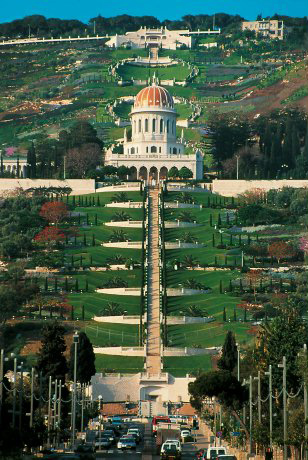The views expressed in our content reflect individual perspectives and do not represent the authoritative views of the Baha'i Faith.
What would you die for? Can you think of anything—your family, your beliefs, your values, your convictions—that trumps the value of your physical life?

Shrine of the Bab on Mount Carmel
At this year’s commemoration of the Martyrdom of the Bab, I found myself thinking about these questions, and about the Bab’s ultimate sacrifice. The Bab, the Herald of the Baha’i Faith, gave his life willingly to advance a set of ideals, to bring a new set of progressive beliefs into the world. Then my thinking drifted to the martyrdom of Tahirih—that great follower of the Bab and advocate for the emancipation of women—and then to others, including my own ancestors. These included able-bodied men who died fighting in self-defense during the upheavals of Nayriz in 1850 and 1853, as well as women, old men, and even children who died on a death march from Nayriz to Shiraz in 1853. All of them followed the new teachings of the Babi and Baha’i Faiths, and all of them suffered dearly for their beliefs. Beyond these obvious cases, we now witness the myriad contemporary Baha’is whose lives are cut short by exclusion from medical care or impaired by daily humiliation or denial of an education.
The martyrdoms of the Bab and Tahirih were acquiescent. They proclaimed a new belief system that threatened political and ecclesiastical authority—and, as a result, were victims of state-sanctioned murder. They accepted their physical deaths resolutely. After them, thousands of Babis and Baha’is died with the same acquiescence at the hands of mobs or the state. Their spiritual conduct, just like Christian martyrs in the Roman Empire, identified them as ordinary people seeking nothing more than to live peacefully and follow a new religion. For this, they were subjected to fiendish horrors.
But because the Baha’i Faith values thinking over blindly following the local mullahs, Baha’is tended to do better than their neighbors, often stuck in the old ways. Since the Baha’i principles stressed the education of girls, the future mothers of everyone, the succeeding generations of Baha’is flourished. This provoked jealousy among those left behind by ignorance–and jealousy on a massive scale led to more persecution.
So far, every generation of Babis and Baha’is in Iran have suffered. Furthermore, our suffering has been voluntary. We could walk away from our Faith. But we haven’t, we don’t and we won’t.
No one knows what the future may bring—what tests and difficulties will arise. But we do know that the qualities of steadfastness and sacrifice when confronting adversity have given the world new hope. Now, the struggles and confirmations of the Babis and early Baha’is are a source of inspiration. Shoghi Effendi, the Guardian of the Baha’i Faith, compared the martyrdom of the Bab to the martyrdom of Christ:
It would indeed be no exaggeration to say that nowhere in the whole compass of the world’s religious literature, except in the Gospels, do we find any record relating to the death of any of the religion-founders of the past comparable to the martyrdom suffered by the Prophet of Shíráz [the Bab]. So strange, so inexplicable a phenomenon, attested by eye-witnesses, corroborated by men of recognized standing, and acknowledged by government as well as unofficial historians among the people who had sworn undying hostility to the Bábí Faith, may be truly regarded as the most marvelous manifestation of the unique potentialities with which a Dispensation promised by all the Dispensations of the past had been endowed. The passion of Jesus Christ, and indeed His whole public ministry, alone offer a parallel to the Mission and death of the Báb, a parallel which no student of comparative religion can fail to perceive or ignore. In the youthfulness and meekness of the Inaugurator of the Bábí Dispensation; in the extreme brevity and turbulence of His public ministry; in the dramatic swiftness with which that ministry moved towards its climax; in the apostolic order which He instituted, and the primacy which He conferred on one of its members; in the boldness of His challenge to the time-honored conventions, rites and laws which had been woven into the fabric of the religion He Himself had been born into; in the role which an officially recognized and firmly entrenched religious hierarchy played as chief instigator of the outrages which He was made to suffer; in the indignities heaped upon Him; in the suddenness of His arrest; in the interrogation to which He was subjected; in the derision poured, and the scourging inflicted, upon Him; in the public affront He sustained; and, finally, in His ignominious suspension before the gaze of a hostile multitude—in all these we cannot fail to discern a remarkable similarity to the distinguishing features of the career of Jesus Christ.
It should be remembered, however, that apart from the miracle associated with the Báb’s execution, He, unlike the Founder of the Christian religion, is not only to be regarded as the independent Author of a divinely revealed Dispensation, but must also be recognized as the Herald of a new Era and the Inaugurator of a great universal prophetic cycle. Nor should the important fact be overlooked that, whereas the chief adversaries of Jesus Christ, in His lifetime, were the Jewish rabbis and their associates, the forces arrayed against the Báb represented the combined civil and ecclesiastical powers of Persia, which, from the moment of His declaration to the hour of His death, persisted, unitedly and by every means at their disposal, in conspiring against the upholders and in vilifying the tenets of His Revelation. – Shoghi Effendi, God Passes By, p. 56.
Both Christ and the Bab died voluntarily, for a set of universal ideals centered on love, peace and unity. Their suffering, and their triumph, ought to make us all ask what we would die for.
















Comments
Sign in or create an account
Continue with Googleor